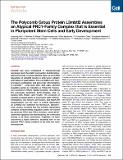The Polycomb Group Protein L3mbtl2 Assembles an Atypical PRC1-Family Complex that Is Essential in Pluripotent Stem Cells and Early Development
Author(s)
Qin, Jinzhong; Whyte, Warren A.; Anderssen, Endre; Apostolou, Effie; Chen, Hsu-Hsin; Akbarian, Schahram; Bronson, Roderick T.; Hochedlinger, Konrad; Ramaswamy, Sridhar; Young, Richard A.; Hock, Hanno; Young, Richard A.; Whyte, Warren Anthony; ... Show more Show less
DownloadQin-2012-The Polycomb Group P.pdf (10.46Mb)
PUBLISHER_POLICY
Publisher Policy
Article is made available in accordance with the publisher's policy and may be subject to US copyright law. Please refer to the publisher's site for terms of use.
Terms of use
Metadata
Show full item recordAbstract
L3mbtl2 has been implicated in transcriptional repression and chromatin compaction but its biological function has not been defined. Here we show that disruption of L3mbtl2 results in embryonic lethality with failure of gastrulation. This correlates with compromised proliferation and abnormal differentiation of L3mbtl2−/− embryonic stem (ES) cells. L3mbtl2 regulates genes by recruiting a Polycomb Repressive Complex1 (PRC1)-related complex, resembling the previously described E2F6-complex, and including G9A, Hdac1, and Ring1b. The presence of L3mbtl2 at target genes is associated with H3K9 dimethylation, low histone acetylation, and H2AK119 ubiquitination, but the latter is neither dependent on L3mbtl2 nor sufficient for repression. Genome-wide studies revealed that the L3mbtl2-dependent complex predominantly regulates genes not bound by canonical PRC1 and PRC2. However, some developmental regulators are repressed by the combined activity of all three complexes. Together, we have uncovered a highly selective, essential role for an atypical PRC1-family complex in ES cells and early development.
Date issued
2012-09Department
Massachusetts Institute of Technology. Department of Biology; Whitehead Institute for Biomedical ResearchJournal
Cell Stem Cell
Publisher
Elsevier B.V.
Citation
Qin, Jinzhong, Warren A. Whyte, Endre Anderssen, Effie Apostolou, Hsu-Hsin Chen, Schahram Akbarian, Roderick T. Bronson, et al. “The Polycomb Group Protein L3mbtl2 Assembles an Atypical PRC1-Family Complex That Is Essential in Pluripotent Stem Cells and Early Development.” Cell Stem Cell 11, no. 3 (September 2012): 319–332. © 2012 Elsevier Inc.
Version: Final published version
ISSN
19345909